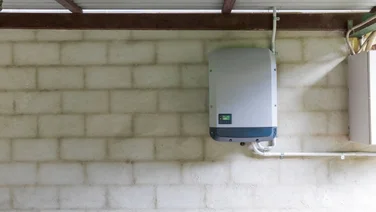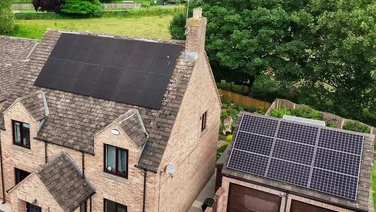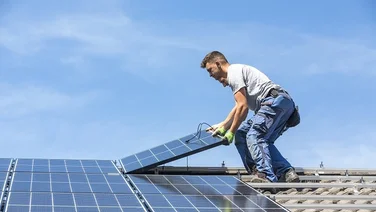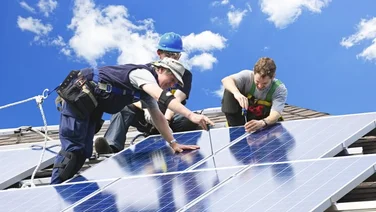We receive a small fee from trusted installers when you request a quote through our site. This helps us keep our content independent, well-researched and up to date – Learn more
- Solar panel efficiency can vary depending on environmental factors
- Proper installation and handling can keep your solar panels efficient for longer
- Care and maintenance of panels will ensure they lose their efficiency slower
Solar panels are an increasingly popular option for homeowners and businesses – they can reduce your carbon footprint and save on energy costs, depending on their efficiency and power output.
And with solar panel prices decreasing over time, there’s never been a better time to invest.
The first quarter of 2023 saw a 114% increase in the number of renewable energy installations compared to the same period in 2022 (MCS, 2023).
Thinking of joining them? Pop a few details in this short form, and our expert installers will get back to you with bespoke quotes.
In the meantime, let’s explore the factors that affect solar panel efficiency and how you can ensure you’re getting the most out of your solar panels.
Where do you want to install solar panels?
Get started
What is solar panel efficiency?
Solar panel efficiency measures how well a solar panel can convert sunlight into usable electricity.
The maximum efficiency of the best solar panels on the market today is around 22-23%. We’d all like solar panels to be at the 100% mark, but science hasn’t got that far yet. The ‘photovoltaic effect’ of solar panels (i.e., how sunlight gets converted into electricity) has its limits.
Many factors can affect solar panel efficiency, including the quality of the materials and some other environmental aspects we’ll explore in more detail below.
Why do solar panels lose efficiency over time?
Although some solar panels have a maximum efficiency of around 22-23%, this rate will naturally decrease over time. Want to get a better understanding of why? We go into more detail below.
1. Age-related wear and tear
Like anything else, solar panels experience a bit of wear and tear as they age.
Mother Nature doesn’t take it easy on them, with seasonal debris, pollution, and dust all leaving their mark. Bird droppings and tree sap can accumulate on your panels, blocking out precious sunlight and reducing your energy production.
It’s a slow process, but over time, this natural wear and tear can lead to a slight dip in efficiency of 0.5-0.8% each year according to the National Renewable Energy Laboratory (NREL).
How to prevent it
Set a regular date with your panels for a gentle clean. Washing off all that dust and debris will let them soak up the sun unimpeded.
You can find out more about this by visiting our Complete Guide to Solar Panel Maintenance.
2. Weather
Speaking of seasons, your solar panels are battling the elements day in and day out. Severe weather can leave them with a few bruises and scratches, as well as a build-up of dirt and grime.
Hailstones are like tiny footballs pelting your panels – they can cause cracks, affecting the panels’ performance. Snow can also blanket your panels, both preventing them from getting winter sun and causing damage from the extra weight.
If your home is by the coast, there’s another invisible enemy: moisture. High humidity and salty sea mist can creep in and cause corrosion.
How to prevent it
Choose high-quality, well-sealed panels that can withstand the tougher weather in your location and have your panels professionally installed at an appropriate angle – this will encourage the snow and rain to slide off and give you a head start on your cleaning efforts.
Where do you want to install solar panels?
Get started3. Light-induced degradation
Solar panels experience a phenomenon similar to human sunburn called light-induced degradation (LID).
When your solar panels are exposed to sunlight for the first time, some of their silicon cells can react in a way that reduces their initial output, causing a slight drop in their efficiency.
Fortunately, this is usually temporary, and the panels will recover naturally over time.
How to prevent it
While there isn’t much you can do to physically prevent this, opting for panels from manufacturers that pre-treat for LID can help. This is when manufacturers ‘pre-bake’ or ‘condition’ the panels under intense light and heat before they’re sold.
Plus, high-quality panels are designed with materials that can better resist the effects of LID. Think of it as providing your panels with ‘sunscreen’ to help them perform their best from day one and for years to come.
4. Potential-induced degradation
Potential-induced degradation (PID) is where the electrical voltage running through your solar panels reacts with the panel’s materials, potentially causing the elements that are supposed to be producing energy to drain instead.
PID can be problematic in solar panels exposed to high temperatures and humidity. It’s like the solar panel’s version of a power surge – it doesn’t do them any good.
How to prevent it
Again, it’s difficult to prevent or even predict PID. However, proper system grounding during installation can help maintain a stable electrical voltage and reduce the risk of PID. This could include the use of inverters with ‘PID recovery’ functions.
Regular checks and professional maintenance can also identify PID early and correct it before it significantly affects your panels’ performance.
5. Thermal degradation
Solar panels work best in moderate temperatures. While solar panels need good old-fashioned sunlight to produce electricity, too much heat can be detrimental to their performance.
The hotter they get, their ability to convert sunlight into energy diminishes because the electrons need more energy to move around quickly. This phenomenon is known as thermal degradation.
At the other extreme, very cold conditions can cause the materials to contract, which could lead to mechanical stress and damage.
How to prevent it
Get ahead of thermal degradation by opting for panels with a lower temperature coefficient – they’re better at withstanding heat, as their efficiency drops less in response to heat. And for those chilly days, choose panels designed to withstand frosty conditions.
6. Poor installation and handling
To get the best performance and lifespan out of your solar panels, you must install and handle them correctly.
Poor placement or incorrect angling can make the panels less efficient, as it can decrease the panels’ ability to absorb sunlight, although using a solar tracker can help prevent this.
Faulty wiring can also lead to energy losses or even damage to the system.
Careless handling can also cause micro-cracks, which degrade the panels’ performance over time or even cause cells to disconnect in the worst cases.
How to prevent it
Preventing these issues largely comes down to choosing an MCS-certified installer.
An experienced professional will understand how to best place and angle the panels to optimise sunlight exposure for your location and allow sufficient airflow to keep it cool around them, as well as how to correctly wire the system.
7. Inferior panel quality
The efficiency and lifespan of your solar panels greatly depend on their quality.
Opting for low-quality panels might seem like a bargain initially, but they could be less efficient right out of the box and degrade more rapidly over time.
It’s not just about the materials, though. The construction quality plays a role too – well-built panels have robust connections between cells, reducing chances of damage or failures.
How to prevent it
Invest in panels from a reputable manufacturer. While they might cost more upfront, they can pay off in the long run by maintaining their efficiency longer and providing a more reliable source of solar energy.
Manufacturers with rigorous quality control processes are more likely to deliver panels that meet high standards, reducing the chances of defects or susceptibility to PID that could hamper efficiency.
Also, remember to look at the efficiency rating and temperature coefficient – with higher-quality panels, these numbers are more favourable.

How much efficiency does a solar panel lose over its lifetime?
Solar panels typically degrade at an average rate of about 0.5-0.8% per year, according to most manufacturers’ specifications and independent studies. This rate might be higher during the first year (around 2-3%) due to LID as mentioned above, but it soon stabilises.
As we’ve explored, several factors can influence this degradation rate, including panel quality, local weather, and maintenance. Higher-quality panels often degrade slower, so investing in more efficient panels from a reputable manufacturer can pay off in the long run.
How long do solar panels remain effective?
Solar panels are usually under warranty for 25 years, during which they’re expected to maintain a significant percentage of their initial efficiency.
With proper care and maintenance, they can often remain effective and continue to generate electricity for many years beyond that, often up to 30-40 years.
After 25 years, solar panels typically reach the end of their warranty period, but they don’t stop working abruptly.
You can expect a solar panel to keep at least 75% of its initial efficiency and, with proper care, it can remain operational for up to 30-40 years.
Given the typical degradation rate of about 0.5-0.9% per year, a 10-year-old solar panel can be expected to keep 90-95% of its original efficiency.
Starting with an efficiency of 20%, it should still deliver around 18-19% efficiency after a decade.
Next steps
From age-related wear and tear to quality control, many things can impact your solar panels’ performance. But now you can make informed choices for maximum efficiency.
Fancy making the jump into solar energy? Pop your details into our web form and our expert team will get in touch with free, personalised quotes.









